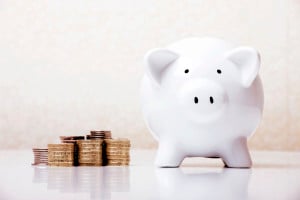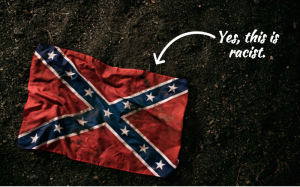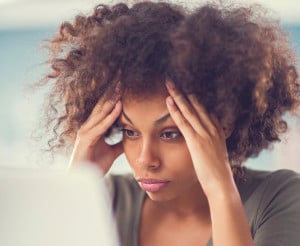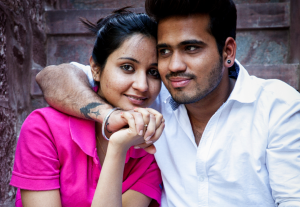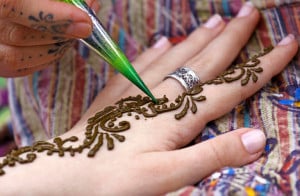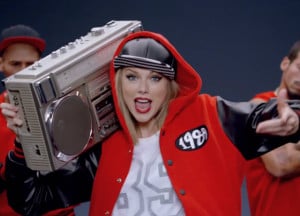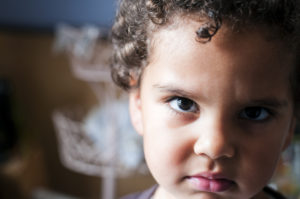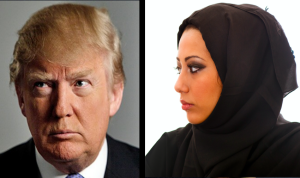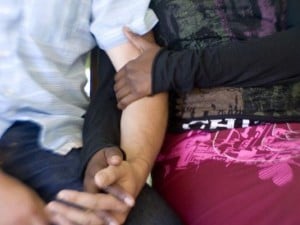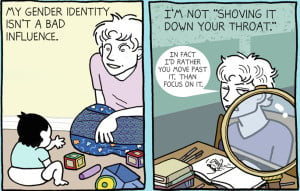Author’s Note: This article is written from a White, cisgender, straight male’s perspective – in other words, from my perspective. Throughout, I discuss primarily experiences and research involving cisgender men and women, but I must acknowledge the limitations of such a perspective. For more insight into trans, genderqueer, and non-binary perspectives, I encourage you to start with the work of Everyday Feminism contributing writers, Adrian Ballou and Kaylee Jakubowski (to name a couple).
Let me tell you a fascinating story:
Thirty minutes after waking up, I zipped to the school at which I teach and experienced a damn fine day of teaching. Upon my return home, I headed out for a run on an unseasonably warm March afternoon.
After a family dinner and tagging out of the bedtime routine for our four-year-old, I walked to a coffee shop, where I finally started this article, an achievement I rewarded with a short dose of Netflix.
What’s fascinating about this story has little to do with the less-than-scintillating ways I spent my time, but it has everything to do with the staggering display of male privilege this story reveals.
Let me break it down, starting with the alarm clock.
1. I Have the Privilege of a Short Morning Routine
(“Harp” alarm noise.)
To my obnoxious alarm, I lithely woke up, as the weight of an entire culture – male-dominated, market-driven – does not rest on my physical attractiveness.
Advertisements do not routinely divide my body into tiny increments and then proceed to tell me that each increment fails miserably (unless, of course, you buy some product).
They do not paste to the inside of my eyelids an unattainable image of beauty for my gender (that consists of a body type that only about 5% of women have – even fewer if you consider that this image is nearly exclusively White).
Because I can, for the most part, evade advertising that preys on and nurtures insecurities, I can sleep in and enjoy more time in the morning.
To perpetually tired and overworked women making ends meet, these privileges might trump the extra money I’m likely to make (according to one study, even my home – “liberal” Seattle – has one of the worst gender pay gaps of “50 major metropolitan areas in the US”).
I can roll out of bed, leave the house with my short hair still wet, and arrive to work at 8am, makeupless, shoving my shirt into my pants – without any repercussions.
In contrast, many women must meticulously ready themselves for the day.
Even the morning routines of some of business’ most powerful women, according to Forbes, include cooking breakfast for the family. (I wonder how many of 355 men on the Forbes 400 Richest Americans list integrate into their morning routine a round of eggs for the family.)
At the 2015 Golden Globes, Tina Fey called out the unfairness of such imbalanced routines:
“Steve Carrell’s Foxcatcher look took two hours to put on, including his hairstyling and makeup. Just for comparison, it took me three hours today to prepare for my role as a human woman.”
2. I Have the Privilege of a Gender That Confers Authority
I work damn hard at teaching, and such dedication certainly accounted for much of my “damn fine day of teaching” that day in March. But hard work is rarely, if ever, the sole driver of any success story.
Long before students reach my classroom, they have been trained for the past 17-18 years to think of my gender as the authority.
They might have learned it at an early age when assertive girls were smacked down with labels like “bossy” – a reality that recently spurred the Ban Bossy campaign.
They might have learned it from watching media that rampantly objectifies women, often blurring the line between mainstream media and pornography.
They might have learned it from consistently seeing men overrepresented and women underrepresented in positions of power.
And I benefit from all of these lessons as a male teacher.
(Heck, it wouldn’t surprise me if male teachers were the original mansplainers, as men dominated the field long before women replaced them as far cheaper labor.)
And the research confirms my upgraded status as Mr. (not Ms.) Greenberg.
A New York Times column reports that women professors are rated consistently lower than male professors, based on a study of 14 million reviews on RateMyProfessors.com.
Another study of online courses – in which men and women professors gave erroneous genders – led to similar results: Teachers with male names consistently came out on top.
On the topic of work, I also have the privilege of evading scrutiny of my work-life balance, a luxury that even celebrities like Jennifer Garner are unable to enjoy.
Garner recounts constantly being asked about how she manages motherhood and acting, while her husband, actor Ben Affleck, instead gets asked about the “tits” of one of his much younger co-stars.
3. I Have the Privilege of Easy Bathroom Access – Even When There Are No Bathrooms
Between my two-hour classes, I needed to pee – an urge, I’m told by female colleagues, that a penis is able to keep at bay longer (yet another privilege, though physiological and cisgender-specific, to add to the list).
An open urinal or stall was waiting for me, as always.
Such availability is not the norm for many women’s bathrooms, a fact I learned in the late nineties at an Ani Difranco concert – when dozens of women stormed the near-empty men’s bathroom – and one I often see confirmed in airports and at sporting events.
Pee privilege also extends to the outdoors, as it’s not uncommon to see men urinating in public.
While doing so is generally frowned upon – Hamburg’s nightclub district has even invested in urine-repellent paint to discourage the practice – many men still fire away.
I know I do from time to time during my longer runs. But is my ability to dash behind a girthy tree to urinate in an upright position, at least mostly hidden from passersby, simply another physiological advantage?
Or have we just accidentally tinkled on more evidence of a patriarchal culture?
While studying abroad in Kenya, I routinely took long bus trips during which the side of the road was used as rest stops. I routinely witnessed both men and women pee on the side of the road.
Yes, the women wore dresses and sarongs that concealed their lower regions, and, no, I am not arguing that Kenya represents the pinnacle of gender equality.
Nevertheless, women squatting to pee in public can be a cultural norm. Just not for American women.
Thus, here in the US, not only do cisgender men have the physiological luxury of holding it longer, they also have the patriarchal privilege of releasing it sooner (using a penis that is far cheaper to maintain and care for than a vagina).
Probably not the most important privilege that I almost didn’t notice that day, but privileges come in all sizes, and even smaller ones deserve attention.
4. I Have the Privilege to Show Skin
Having finished teaching and feeling an uncharacteristically warm breeze through the classroom window, I bolted home as early as I could.
On this March day, the temperature broke into the 70s, possibly for the first time in 2015. Not unlike that one Portlandia skit mocking sun-deprived Pacific Northwesterners, I did what any runner would do: I took off my shirt during my run.
Except that not everyone can – not without breaking laws and attracting unwelcome attention (not to mention harassment and even violence).
My nipples, as wonderful as they are, apparently pose far less of a threat than women’s nipples.
This unequal nipple treatment has led to nipple activism – two words I don’t commonly associate with each other.
Yet the #FreetheNipple campaign is gaining traction, as many – from an Icelandic teenager to comedian Chelsea Handler – refuse to house their nipples in the kitchen of undergarments any longer.
Trained for so many years to view women’s breasts as near-magical vessels of sexual arousal, I confess that I struggle in retraining my brain for this paradigm shift.
But I know that I can contemplate the shift shirtless in public without repercussion.
A topless woman would unlikely feel safe to do so.
5. I Have the Privilege to Move About Without Fear of Harassment, Assault, or Rape
After (barely) winning the nightly pajama struggle with my four-year-old, I left my family for a coffee shop at 8:15 pm, long after sunset, and traveled one-and-a-half miles along Seattle streets, many of which were poorly lit.
I did not once consider the possibility of street harassment or violence. Even the sight of a shadowy figure on the sidewalk ahead didn’t elevate my heart rate.
Women rarely share this privilege, regardless of the time of day.
According to a study conducted by the advocacy group Stop Street Harassment, 65% of women have experienced street harassment “at some point in their lives.”
Of those women, 41% reported that the harassment included “being followed, touched, flashed, or forced to do something sexual.”
In smaller numbers, men also experience such harassment, but very few of them are straight men like me.
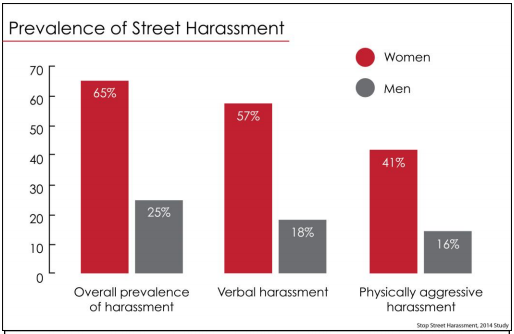
And how does law enforcement treat crimes that primarily target women?
Ask Julia Marquand from Seattle, and you’ll likely get a very negative response. She took a picture of the man who groped her, and when she showed it to the police, the cops dismissed it.
So Marquand turned to social media, posting his picture on Twitter and subsequently attracting a fair amount of media attention, enough that other women came forward with similar stories about the man pictured.
That’s what it took to finally get this man arrested in the fall of 2014.
If Marquand’s story is sobering, then the recently released report by the Centers for Disease Control and Prevention should keep you on the wagon indefinitely:
It revealed that one in five women in the United States has been raped or had experienced an attempted rape. (For a visual of what such a number per year looks like, see this graphic by Vox.)
But this 20% figure obscures the disproportionate crimes that many women of Color face: “51.7% of American Indian or Alaskan Native women, 51.3% of multiracial women, and 41.2% of black women are violently abused by an intimate partner at some point.”
The Gender, Violence, and Resource Access Survey shows that transgender people also face similarly high rates: 50% of transgender people have been “raped or assaulted by a romantic partner.”
And let’s not forget the roles class and nationality can play. Rates of rape for girls and women crossing into the United States from Central America run as high as 80%.
In contrast, men are so privileged that they don’t even have to know what rape means. One study found that many men – 32% – didn’t know that “[forcing] a women to [have] sexual intercourse” counts as rape.
6. I Have the Privilege to Enjoy the Internet Without My Gender Being Assaulted
Once I arrived at the café, following a walk during which nobody asked me to smile, I got to work writing and researching. Like the streets, the Internet is another realm through which I’m free to travel without attacks on my gender.
And I have met a few Internet critics in my time, from White Supremacists to trolls with a Sith-like attraction to the Star Wars trilogies.
Yet not one of these attacks targeted my gender.
Sure, White Supremacists took note of my Jewish last name, but they omitted derogatory comments about my appearance. They didn’t once threaten me with rape.
In contrast, many women face such attacks on a regular basis. But don’t take my word for it. Learn more here and here.
Or ask Ashley Judd, whose tweet about a college basketball game – a fucking basketball game – led to an online onslaught of sexism: “bitch,” whore,” “the c-word,” and threats of rape.
Or learn more about the work of Anita Sarkeesian, who has dedicated her life to eradicating the rampant sexism in video games and gaming culture – but don’t expect to read any YouTube comments for her video web series.
They had to be disabled because of what she describes as a “massive online hate campaign.”
7. I Have the Privilege of Seeing Myself Widely and Positively Represented in the Media
Tired from a long day that included teaching, running, family-ing, and writing, I treated myself to some Netflix time while the rest of the household slept.
Scrolling through the Netflix queue, protagonists of my gender abounded. Not just of my gender, but of my gender and age (42).
Women, on the other hand, tend to disappear as protagonists when they reach my age.
The Huffington Post reports that a woman’s average salary in Hollywood steadily increases until she hits the ancient age of 34, at which point it “drops off rapidly.”
The peak salary for men extends to the age of 51, so I have a few years before the media makes me feel devalued and unimportant.
With media whistleblowers like the Geena Davis Institute on Gender in Media and Jennifer Siebel Newsom’s The Representation Project, such gender-based discrepancies and sexism have been widely documented and exposed, but they persist, nevertheless.
Which is precisely why I was going to get to sleep later the next morning than most women also due to start work by 8:00am.
***
Of course, I’m only scratching the surface of male privilege. I’m sure many women could find many privileges I overlooked. In fact, they already have: here, here, here, here, and here.
And here.
If it takes a man to tell you that male privilege is real and ubiquitous, then you just proved its power.
But before we can dismantle systems of privilege, we must first understand how we unknowingly hold them in place, which means we must make male privilege far more visible.
[do_widget id=”text-101″]
Jon Greenberg is a Contributing Writer for Everyday Feminism. He is an award-winning public high school teacher in Seattle who has gained broader recognition for standing up for racial dialogue in the classroom — with widespread support from community — while a school district attempted to stifle it. To learn more about Jon Greenberg and the Race Curriculum Controversy, visit his website, citizenshipandsocialjustice.com. You can also follow him on Facebook and Twitter @citizenshipsj.
Search our 3000+ articles!
Read our articles about:
Our online racial justice training
Used by hundreds of universities, non-profits, and businesses.
Click to learn more






